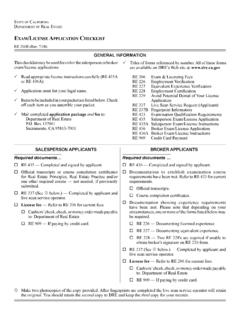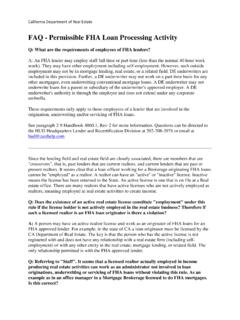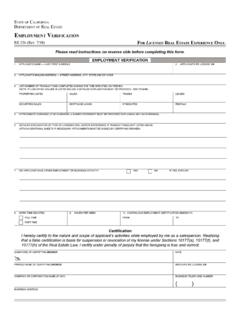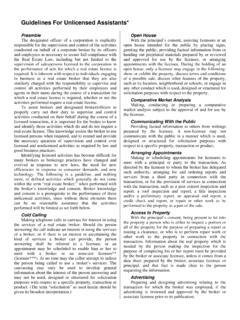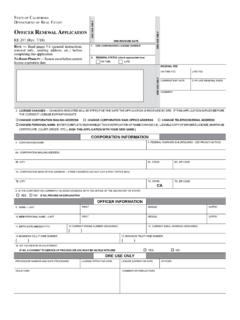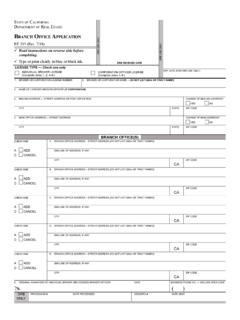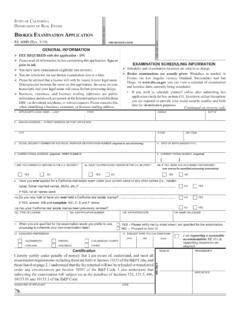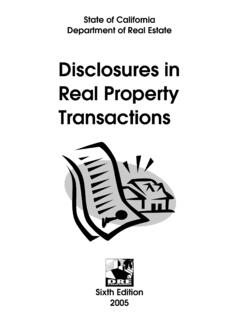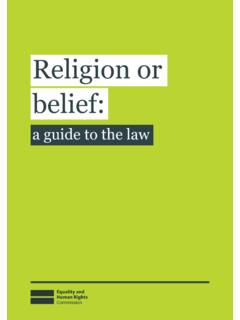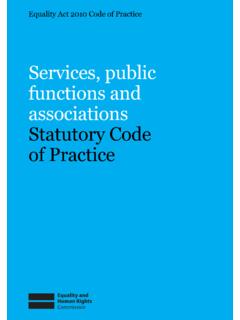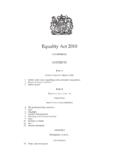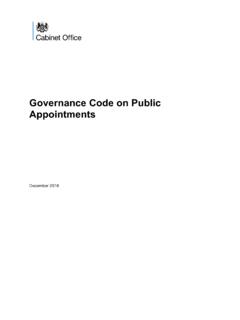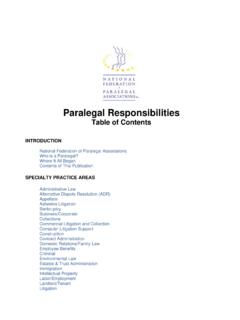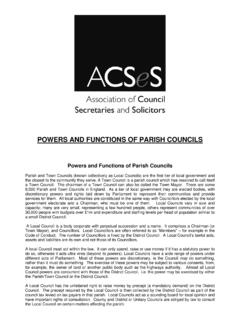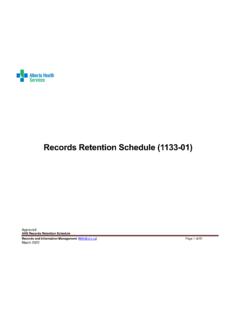Transcription of 1. The California Department of Real Estate
1 1 The California Department of real Estate GOVERNMENT REGULATION OF BROKERAGE TRANSACTIONS As our country s development passed through the pioneering and homesteading stages to urbanization, people across the land found it increasingly difficult to strike a deal with strangers for land and homes. There was a real need for an intermediary to provide basic real Estate knowledge and services and negotiate transactions. The real Estate agent met this need and continues to fill this important role today.
2 Along with increasing opportunities to provide real Estate services to the maturing nation came abuses of the public trust in the form of unethical, illegal or sharp practices by dishonest or incompetent agents operating in a climate of unorganized and often unscrupulous competition. real Estate practitioners themselves began to see the need for government regulation. The public s legitimate interest in the buying, selling, exchanging and financing of real property has led to regulation of the real Estate business through the adoption of legislative and administrative controls.
3 California s Legislature passed the nation s first real Estate licensing law in 1917. The courts declared that law to be unconstitutional, based on its conditions compared to the licensing requirements of the Insurance Commissioner. California then adopted the real Estate Act of 1919, which the State Supreme Court upheld as a reasonable exercise of the power of the state to regulate the conduct of its citizens in the interest of the common good. All fifty states and the District of Columbia have enacted statutes governing, to some degree, the licensing, regulation and conduct of real Estate agents.
4 This type of government regulation and supervision has its foundation in what is known as the police power. The Police Power and the real Estate Law For many people, the phrase police power evokes images of police officers, jails and courtrooms. But the police power involves much more than the business of detecting crime and criminals and maintaining public order and tranquility. The following, excerpted from a United States Supreme Court case, gives a useful description of the police power: By means of it, the legislature exercises a supervision over matters affecting the commonwealth and enforces the observance by each individual member of society of duties which he owes to others and the community at large.
5 The possession and enjoyment of all rights are subject to this power. Under it the state may prescribe regulations promoting the health, peace, morals, education and good order of the people, and legislate so as to increase the industries of the state, develop its resources and add to its welfare and prosperity. In short, police power is the power of the state to enact laws within constitutional limits to promote the order, safety, health, morals and general welfare of our society. The police power does not vest arbitrary authority in any legislative body.
6 Laws emanating from exercise of the police power must be necessary and proper for the protection or advancement of a genuine public interest. Neither state nor local authority may impose onerous, unreasonable, or unnecessary burdens upon persons, property or business. Legislation intended to protect the public safety, health and morals may impact the manner of conducting lawful occupations and businesses without, of course, taking away the right to be gainfully employed.
7 For many years, society has benefited from regulation of professions such as law, medicine and dentistry. More recently, many other professions, including real Estate , have become subject to regulation beyond that of mere licensing. The organized real Estate industry has been among the strongest supporters of the real Estate licensing law. The industry is aware that reasonable regulation of those engaged in the real Estate business benefits the public by creating and maintaining professional standards and ethical practices in the conduct of real Estate brokerage activities.
8 This, in turn, benefits the industry by creating an orderly market place. 2 CHAPTER ONE The real Estate Law exists primarily for the protection of the public in real Estate and mortgage transactions involving the services of an agent. By requiring qualifications for licensing, the law enables the Commissioner to ascertain that persons acting in the capacity of a broker or salesperson meet certain standards of knowledge and honesty and, for the broker license, experience.
9 The Commissioner s authority is not arbitrary. For the Commissioner to find that an applicant for a license is not honest and truthful there must be facts which justify that conclusion. When an applicant has the qualifications required by law, the Commissioner must issue the license. Subdivisions With statutory authority, the Commissioner began regulating the sale or lease of subdivided lands in 1933. Like the 1919 licensing law, the subdivided lands provisions survived the State Supreme Court s test of constitutionality.
10 The court held that the object of the law was the prevention of fraud and sharp practices in a type of real Estate transaction particularly open to abuses. The court said the method of furnishing information to real property purchasers, which involved investigation and written disclosure of certain essential facts, was appropriate protection. This disclosure document is called a public report. Law Codified On August 4, 1943, the Legislature organized the statutory authority of the Department of real Estate (DRE) into the two Parts of Division 4 of the Business and Professions code (hereinafter, the code ).
